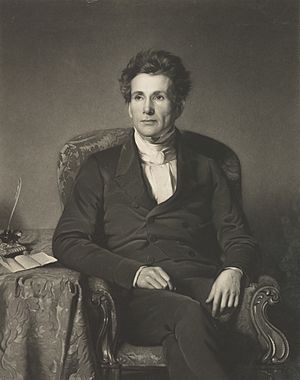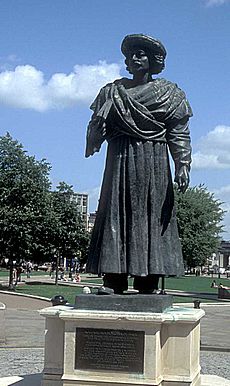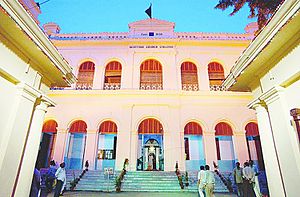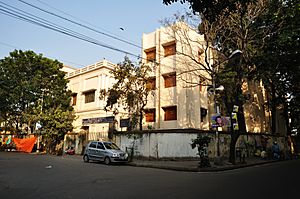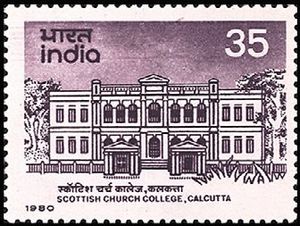Scottish Church College facts for kids
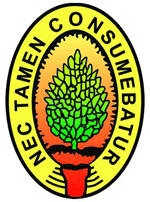
Emblem of the Scottish Church College
|
|
| Latin: Collegium Ecclesiae Scoticae | |
|
Former names
|
1830: General Assembly's Institution 1843: Free Church Institution 1863: Duff College 1908: Scottish Churches College 1929: Scottish Church College |
|---|---|
| Motto | Nec Tamen Consumebatur (Latin) |
|
Motto in English
|
"The bush burns, but is not consumed" |
| Type | Public |
| Established | 13 July 1830 |
| Founder | Alexander Duff |
|
Religious affiliation
|
Church of North India, Presbyterian |
|
Academic affiliation
|
University of Calcutta |
| Principal | Dr. Madhumanjari Mandal |
|
Administrative staff
|
164 |
| Undergraduates | 1518 (As of 2016–17) |
| Postgraduates | 97 (As of 2017–18) |
| Address |
1 & 3, Urquhart Square, Manicktala, Azad Hind Bag
,
,
,
22°32′54″N 88°21′21″E / 22.54837°N 88.35596°E |
| Campus | Urban |
| Language | English, Bengali, Hindi |
| Nickname | The Caledonians |
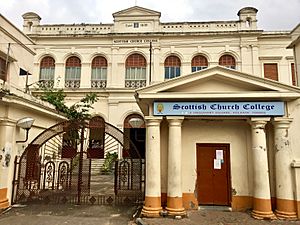 |
|
Scottish Church College is a famous college in Kolkata, India. It's connected to the University of Calcutta. This college is special because it's the oldest Christian college in Asia that has been open non-stop! It offers many different subjects for students who want to get a college degree. The college has even been given an 'A' rating by a group called the National Assessment and Accreditation Council in India. Students and people who used to study here often call themselves "Caledonians." This name comes from the college's big festival, "Caledonia."
Contents
How the College Started
The story of Scottish Church College begins with a man named Alexander Duff. He was the first missionary from the Church of Scotland to travel to India. The college first opened its doors on July 13, 1830, and was called the General Assembly's Institution.
Alexander Duff was born in Scotland in 1806. After finishing his studies at the University of St Andrews, he decided to become a missionary. He set off on a long journey to India. His trip was quite an adventure, as his ship was in two accidents! He even lost most of his books. Finally, he arrived in Calcutta on May 27, 1830.
With help from the Governor-General of India, Lord William Bentinck, Alexander Duff opened his school. It was first located in a house on Chitpore Road. Later, in 1836, the school moved to a different house. The foundation stone for the college's main building was laid on February 23, 1837. The building was finished in 1839.
A Look at History
In the early 1800s, when the East India Company ruled India, it was not easy to start English schools. Many people, including some in the government, preferred teaching in local languages like Persian or Sanskrit. However, Alexander Duff believed that teaching in English was very important. He thought it would help people learn about many new ideas.
A famous Indian social reformer, Raja Ram Mohan Roy, helped Duff a lot. He helped find a place for the school and encouraged the first students to join. He also explained to parents that reading the Bible at school didn't mean students had to change their religion.
Duff wanted to teach students in English so they could learn about European religion, books, and science. He chose teachers, both European and Indian, who were excellent. He also used teaching methods that encouraged students to discuss, ask questions, and think for themselves. This way of teaching helped spread new ideas in Bengal. Even though English was important, Duff also made sure that the local language, Bengali, was taught well. He also believed that sports were important for students.
In 1843, there was a big change in the Church of Scotland. Duff decided to start a new school called the Free Church Institution. He had support from important people like Sir James Outram. In 1844, the government made it easier for students from schools like Duff's to get jobs.
In 1857, when the University of Calcutta was created, Duff's Free Church Institution was one of the first colleges to join it. Later, the General Assembly's Institution and the Free Church Institution joined together to form the Scottish Churches College. In 1929, after the Church of Scotland became one again, the college was named Scottish Church College.
Many great scholars from Scotland and India taught at the college. They helped spread modern Western education. The college also played a big part in promoting education for women. For a long time, it was one of the only colleges in Calcutta that allowed both boys and girls to study together. Today, about half of the students are girls! This college is a great example of how India and Scotland worked together.
Special Stamp
To celebrate the college's history, the Indian Postal Service released a special postage stamp on September 27, 1980.
Campus and Buildings
The college has several buildings. The main building is where departments like economics, history, political science, philosophy, zoology, botany, mathematics, English, Sanskrit, and Bengali are located. There's a separate Science building for physics and chemistry.
The college has a main library that is all set up with computers. The science departments also have a museum and a special 'poly-house' for plants. The campus is very green, with a garden and a lawn. Many special plants, including medicinal ones, are grown here. The college even uses solar lighting, making it a 'green' campus! There's also a separate building for teacher education.
Student Hostels
The college has four hostels, which are like dorms, for its students. They are all close to the college. These hostels have common rooms where students can relax and watch movies or listen to music.
- Lady Jane Dundas Hostel (For Girls only): 71/1 Bidhan Sarani, Kolkata-6.
- Duff Hostel: 32/8, Abhedananda Road, Kolkata-6.
- Ogilvie Hostel: 31/2, Hurtaki Bagan Lane, Kolkata-6.
- Wann Hostel: 32/8 Abhendananda Road, Kolkata-6.
College Publications
The college publishes magazines and journals every year. Students and staff write for these publications.
- The Journal of Humanities and Social Sciences is an academic journal published by the college. It includes research articles from scholars around the world.
- Sanket is a short magazine published every year by the college's Literary Society. It started in 2015.
Fun Activities
National Service Scheme
The college has a National Service Scheme (NSS) unit. This group helps with social work in the community. They have organized programs about the environment, health, and hygiene.
Students from the NSS unit have taken part in big events like the North-East Youth Festival in Arunachal Pradesh and a Mega Camp in Assam. Some students even learned rock climbing and became "Basic Mountaineers"!
The college has won awards from the University of Calcutta for its NSS activities. One professor, Prof. U.N. Nandi, was named the Best Program Officer in 2009. A student leader, Parag Chatterjee, was awarded "Best Volunteer" by the university.
Awards and Special Recognition
In 2006, the college was recognized as a "College with Potential for Excellence" by the University Grants Commission (India). This means it's a really good college!
More About the College
- For a long time, the Church of Scotland helped manage the college. Later, this responsibility was passed to the Church of North India. Because the college was started by Christians, it has special legal status as a religious minority institution in India.
- In 2003, the college buildings were updated and improved with help from former students and supporters.
- Since 2004, the college has been part of the United Board for Christian Higher Education in Asia.
- In 2011, the Scottish Government started a Centre of Tagore Studies in Scotland. This program also connected with the college in Kolkata, helping students and teachers study the works of Rabindranath Tagore.
- The college is building a new Quarto Sept Centennial Jubilee Building. This new building will have modern equipment and audio-visual systems for special lectures.
- On July 13, 2013, Scottish Church College celebrated its 184th Foundation Day. They also held the first Alexander Duff Memorial Lecture. Dr. S.C. Jamir, who used to be a student at the college and later became the Governor of Odisha, gave the first lecture.
See also
- Scottish Church Collegiate School, a school also started by Reverend Alexander Duff, connected to the college.


